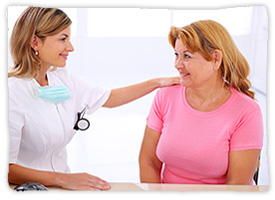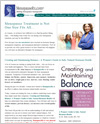As a menopause specialist, I am often asked to review natural supplements. There are plenty of natural options available so I can understand the difficulty one may have in choosing. Most natural supplements for menopause contain either black cohosh, soy, ginseng, red clover, dong quai or their extracts. I recently learned of new supplement that didn’t contain any of these ingredients. I was intrigued and decided to learn more about it. This natural supplement called “Warmi” contains vegetable and fruit extracts, from Peru. The vegetable is believed to have been eaten by Incan women 700 years ago.
I reviewed the Warmi research. There are three clinical trials completed but not published on the product. It appears to offer the hot flash, cold sweat and mood swing relief I’ve found with better natural menopause remedies.
Read more…
Categories: Health, HRT, Medical Updates, Menopause and Perimenopause Symptoms, Menopause and Perimenopause Treatments, Product/Supplement Review Tags: Bone Health, Brain Health, Cancer, estrogen, Health, hormone, Hot Flases, hot flashes, libido, menopause, natural remedies, night sweats, Wellness, Women's Health
In women, estrogen loss found in the perimenopausal and menopausal transition can sometimes mimic symptoms of more serious illnesses, like Alzheimer’s Disease. Estrogen influences language skills, mood, attention, and a number of other functions in addition to memory. Estrogen related cognitive deficits may be differentiated from those associated with other conditions through a careful history, examination and testing, so see you doctor soon. Early differential diagnosis and treatment is key to delay the progression of Alzheimer’s Disease.
For more information visit
http://www.alz.org/shriverreport/index.html
4FBCBC56-9116-F5C5-F742-5DF672565B30
1.03.01
The perimenopause is a confusing time for women. The perimenopause is a distinct transition between the reproductive years and cessation of menses. This article will hopefully help to explain and offer treatment options for this often frustrating transition. The World Health Organization defines the onset of the perimenopause as the beginning of menstrual cycle changes. Early perimenopause changes include the first break in regular cycling of menses. Late perimenopause is classified after missing 3 to 11 months of menses, while menopause is reached after 12 months of no menstrual flow. Women usually notice the onset of perimenopause symptoms during their 40’s and irregularities usually persist for approximately 5 years.
The range of perimenopause symptom duration may be quite variable, from 2 to 8 years, or even longer. In general, the later in life that perimenopause symptoms begin, the shorter the transition to menopause. The hormonal changes taking place probably represent the major cause of symptoms experienced. These changes can produce many symptoms that are traditionally thought to only occur after menopause.
Contrary to popular belief, the perimenopause may be associated with elevations of estrogen levels. However, these elevations are generally followed by abrupt falls in estrogen levels. The constantly changing hormone levels of the perimenopause can precipitate significant hot flashes and night sweats. The ‘peaks and valleys’ of estrogen production during the hormonal ‘roller coaster’ invariably contribute to these symptoms. Other medical conditions commonly seen during the perimenopause years that can mimic these symptoms are thyroid irregularities and diabetes.
Read more…
Categories: Hot Topics, Menopause and Perimenopause Symptoms, Menopause and Perimenopause Treatments Tags: black cohosh, estrogen, Health, hormone, hot flashes, HRT, menopause, natural remedies, night sweats, Women's Health
Consumer Reports’ ‘Dirty Dozen’: 12 Risky Supplements
These Products May Do More Harm Than Good, Reviewers Warn
Aug. 3, 2010—
In 2009, Americans spent close to $27 billion on supplements — but some of them could be more harmful than good.
This topic was introduced on Good Morning America this week when Dr. Richard Besser discussed the “dirty dozen” supplement ingredients list released by Consumer Reports…
We suggest that you research whether you may be taking one or more of these “dirty dozen” products. As a consumer, you need to thoroughly investigate each and every supplement that you take. While it is important to review your supplement regimen with your doctor, remember, many physicians are not taught about natural products or supplements. If your physician is not knowledgable about your supplements, don’t hesitate to discuss with your pharmacist. Below is a list of the 12 products mentioned in the report.
1. Aconite
2. Bitter Orange
3. Chaparral
4. Colloidal Silver
5. Coltsfoot
6. Comfrey
7. Country Mallow
8. Germanium
9. Greater Celandine
10. Kava
11. Lobelia
12. Yohimbe
Source: Natural Medicines Comprehensive Database, Professional Version, June 2010
We have checked out the MenopauseRx Store for your safety!
We are asking that you do the same for your medicine cabinet.
Categories: Discussions, Health, Hot Topics, Medical Updates, Menopause and Perimenopause Symptoms, Uncategorized Tags: Consumer Report, Dirty Dozen, Good Morning America, Harmful Supplements, menopause, MenopauseRx, Supplement, Warning, Women's Health
 Hormone therapy is prescribed for troublesome symptoms during menopause. While very effective in treating symptoms such as hot flashes, night sweats and mood changes, its use has declined due to safety concerns. These safety concerns became very well publicized after the 2002 report from the Women’s Health Initiative study. Click here for more information.
Hormone therapy is prescribed for troublesome symptoms during menopause. While very effective in treating symptoms such as hot flashes, night sweats and mood changes, its use has declined due to safety concerns. These safety concerns became very well publicized after the 2002 report from the Women’s Health Initiative study. Click here for more information.
Currently, the use of hormone therapy is still considered the gold standard for treating moderate to severe menopause symptoms. Due to safety concerns, use is generally limited to the lowest effective dose for the shortest time frame. However, women still have concerns about the potential risks associated with hormone therapy use. Fortunately, there is new research showing a potential benefit to alternative ways that hormone therapy is administered.
Hormone therapy is commonly administered in an oral tablet form. However, hormones can also be delivered effectively via the skin in a transdermal patch form. Due to the manner in which the hormone is metabolized once absorbed, practitioners have wondered if the patch is a safer way to deliver hormones. Click here for more information.
Good News for Women
Fortunately, two recent studies have found the transdermal patch to be a potentially safer way to administer menopause hormones. Most recently, Dr. Suissa and colleagues from McGill University in Montreal reported that the use of a low dose estrogen patch does not seem to increase the risk of stroke(1). In March, the same group reported that the patch was not associated with an increased risk of blood clots in postmenopausal women. Read more…
What are the Risk Factors for an underactive Thyroid (i.e. hypothyroidism)?
In the U.S., between 7 and 10% of the population over the age of 55 are affected by a thyroid disorder, with Caucasians more commonly affected than African-Americans. Females are 5-8 times more likely to have a thyroid disorder compared to men.
Hypothyroidism can be due to a variety of causes, including history of thyroid radiation, treatment for an overactive thyroid (Graves disease), removal of thyroid gland, and certain medications, such as lithium, amiodarone and iodine. The most common cause of hypothyroidism is a medical condition called Hashimoto’s thyroiditis.
What are the Symptoms of Hypothyroidism?
The symptoms of hypothyroidism can initially be very insidious. Some studies have found only 25-70% of elderly showing typical symptoms. A clinical exam does not establish the diagnosis in many cases. In fact, only 10% of patients with confirmed hypothyroidism were identified on a physical exam. The most important aspect of hypothyroidism is to be very cognizant regarding the subtle signs and symptoms that may develop. Alerting your physician to these signs and symptoms would allow laboratory testing to confirm the diagnosis.
Common symptoms include:
- dry skin
- hair loss
- cold intolerance
- confusion
- difficulty in concentrating
- constipation
- fatigue
- sluggishness
- hoarseness
- depression
- muscle cramps
- weight gain
- menstrual irregularities
Notice that many of these symptoms can easily be confused with menopause and perimenopause symptoms….Read on to help figure out how to diagnose a thyroid disorder.
Read more…
New eNewsletter Archive
 MenopauseRx has created an easy to use archive of our latest newsletters for quick and easy review.
MenopauseRx has created an easy to use archive of our latest newsletters for quick and easy review.
Here you’ll find past issues of our member’s only newsletters that contain news and study information related to your menopausal transition.
– To access the archive, click here.
Categories: Health, Hot Topics, HRT, Laboratory Testing, LifeStyle, Medical Updates, Menopause and Perimenopause Symptoms, Menopause and Perimenopause Treatments, Osteoporosis, Product/Supplement Review, Wellness Tags:
(NAPSI)-Here’s a fact that you may want to sleep on. According to the National Sleep Foundation, nearly 75 percent of women between the ages of 30 and 60 are not getting the eight hours of sleep they need.
Many women find it difficult to unwind at the end of the day and are left tossing and turning, trying to fall asleep and waking up in the middle of the night. Often blamed are hectic lifestyles filled with daily stress, anxiety and responsibilities, but there may be more to what’s keeping women up at night.
If you’re a woman between the ages of 35 and 55, you may be experiencing hormone fluctuations due to perimenopause and menopause, which can cause a number of physical and emotional changes including increased irritability, anxiety and night sweats. These changes may upset your body’s natural sleep pattern. In fact, according to a recent study, sleeplessness is the number-two complaint of menopausal women.
Researchers believe that lack of quality sleep may contribute to obesity, diabetes, immune system dysfunction as well as safety issues such as car accidents and medical errors, not to mention impaired job performance and productivity in other activities.
Read more…
#10: This is not your grandmother’s menopause
At the turn of the 19th century, a woman’s average life expectancy was 48.3 years. Most women did not live beyond their childbearing years. Today, if you are 45 years old, you can expect to live another 35-40 years. Some would say that it’s not natural for a woman to live so many years without the benefits of the hormones they had when they were younger. Menopause is a natural part of life, not a disease; you can expect to stay fit and healthy after menopause.
#9: Know what’s happening physically
Estrogen is necessary for reproduction and provides you with feminine characteristics. When your ovaries stop producing the hormones necessary for pregnancy your periods stop as well. Menopause is merely your last menstrual period. For many women, the changes leading to menopause begin a few years before their last period, and during this time of hormonal fluctuation, they may experience hot flashes, sleep disturbances, night sweats, palpitations, headaches, mood swings, and fatigue.
#8: Menopause can affect sexual function
Women experience the effects of menopause in a variety of ways. Lack of hormones can affect the lubrication of the vaginal wall. As a result, you might experience vaginal dryness that makes sexual intercourse painful. You shouldn’t have to have pain with intercourse.
Read more…
GREEN BAY, WI, April 18, 2007-Many women are choosing dietary supplements for the management of menopausal symptoms – especially since serious health concerns have been raised about hormone replacement therapy (HRT). Remifemin® black cohosh extract, the most extensively researched, non-prescription menopausal therapy has been found to safely and effectively reduce hot flashes, night sweats and irritability. Now, a study published in the International Journal of Cancer: 120, 1523-1528 (2007), has shown that this proprietary herbal product lowers the risk of breast cancer by as much as 60%.
“The standardized Remifemin® black cohosh extract has antiestrogenic, antiproliferative and antioxidant properties,” said Dr. Eckehard Liske, Director of the International Medical Department, Schaper & Bruemmer GmbH & Co KG, Salzgitter, Germany. “Rebbeck’s research suggests that Remifemin® may help in reducing the risk of breast cancer.”
Read more…




